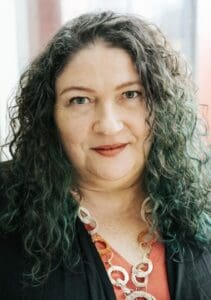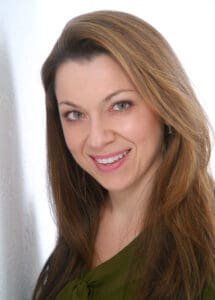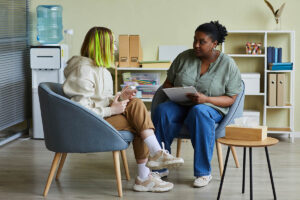A Conversation on OCD and Autism: Dr. Rebecca Sachs and Dr. Yael Clark
Dr. Yael Clark, a psychologist specializing in the treatment of OCD, realized she was autistic only after her child received a diagnosis of autism.
Dr. Sachs: You play different roles in life with different identities: mom, therapist, autistic human. Tell us a little about how they overlap and how they can feel separate.
Dr. Clark: I trained as a developmental psychologist almost 20 years ago and the science was pure behaviorism. Fast forward 13 years, and I began to use my psychologist superpowers to understand the social difficulties of my then-10-year old. I suspected autism but none of my colleagues or her teachers agreed. As I searched for answers, I learned that autistic adults had established online forums where “autistic” and “lived experience” voices were heard. My understanding of autism became rich and nuanced. My understanding of my daughter and then of myself grew in leaps and bounds. When I was trained, subtle, nuanced, masked autism was not known about. That’s why I never realized my daughter and I are autistic. The personal became professional and the professional is personal.
Dr. Sachs: Wow. So many thoughts about what you said. I think your experience is a common one — self-diagnosis (and professionals “poo-pooing” that), along with the experience of coming to an autism diagnosis as a result of the process you were taking with your child. We hear about this a lot for both the autism and OCD experience. Also, I love hearing that it was the community of “autistic” and “lived experience” voices that helped you best understand autism, being autistic, and how to support your child with autism and OCD. I know reading books, following the hashtag #actuallyautistic, and having autistic friends (some with OCD and anxiety, some without) have helped me gain a better understanding of how to support individuals with these co-occurring conditions. I know it is helpful for many of the families I work with to best understand how to support their children or partners by also listening to autistic voices. Feeling part of a community, and that you or your family are not broken (but just different) can be transformative.
Dr. Sachs: How do you think your autism informs being a therapist? Being a parent?
Dr. Clark: As far as my parenting, I know that I have often been criticized for explaining too much to my children. I just know that I always needed reasons and the information, so that's what I gave to my children. I never accepted authority or hierarchy “just because” so why should I expect my children to. I didn’t know that these are typical autistic ways of processing demands and expectations. As a therapist, being autistic is a gift! Most of my clients are either neurodivergent or have a trauma history and we just “speak the same language.” We share information, stim (do self-stimulatory behaviors), and go off on tangents — all as authentically autistic ways to process our experiences. I know it’s not necessarily the goal of therapy to have fun, but we do indeed have a lot of it!
Dr. Sachs: Yes; I think that while CBT with exposure therapy can seem hard and scary there are so many opportunities to have fun. I often find when we capitalize on the specialized interests of autistic patients, exposure work can be so much more engaging.
I think it’s so interesting how you mentioned “we speak the same language.” Recently, I have been thinking a lot about Dr. Damian Milton’s theory of the double empathy problem. He suggests that when people with very different experiences of the world interact with one another, they will struggle to empathize with each other. So, from the position of the non-autistic onlooker, autistic people can seem to have an impaired understanding of social life and other people. And while this may be true about interacting with non-autistics, from the position of an autistic onlooker, neurotypical individuals seem to have an impaired understanding of the social life of neurodivergent people. An example I like to give is often when an autistic patient shares something difficult and is vulnerable, I (as a neurotypical) have an urge to get up and hug them. I know better and just say out loud “I’m having an urge to hug you, but recognize that might not be welcome – what do you want for comfort now?”
I know we do a good job with family work when OCD is present in addressing this. While there is responsibility placed on people with OCD to “do the therapy work” and strive to understand how their OCD impacts their family members, we also make sure to incorporate family members in understanding (through psychoeducation, support groups, conversations with their family members and “exercises'') what it is like to have OCD and thus how best to respond. I don’t think this is always the default mindset when working with neurodiverse families. However, adding this perspective into treatment can go a long way.
Dr. Sachs: For neurotypical parents, what do you think are the most important things for them to know about their autistic children with OCD?
Dr. Clark: Your child is already stressed, just from coping in the neurotypical world. Often being autistic is to be constantly invalidated (“it’s not that

loud/spicy/busy/bright… etc.”), so it is incredibly important to make every effort to address OCD (even with exposure and response prevention) with validation, support, and empathy. This can be the truth with anyone suffering from OCD, but there will be many times when your child is so convinced that OCD is telling them the truth — but especially as concrete thinkers who can also find it difficult to shift from a train of thought. In these moments, it will be up to you to step in and get them out of the accommodation loop. While you can’t convince your child about their OCD thoughts, you can change your reaction to OCD’s demands. It’s important to always let your child know you are responding the way you are to help them though the OCD, and never to punish. This message may need to be repeated a lot, presented visually (like in a social story) or with an intimate routine explanation (almost like an inside joke), but it’s important to concretely communicate it. A useful place to start is to focus on the compulsions that affect you. With this, you can emphasize that you are not going to let OCD scare you into doing unhelpful things. I often explain OCD very scientifically to autistic kids; we look up neurobiology together, and for their logical problem solving minds, I take the time to explain reinforcement.
Dr. Sachs: I think you said it perfectly: be sure to validate, provide simple and repeated explanations that are meaningful, use visuals, and find a way to connect with your loved one while they are approaching the discomfort. But also recognize that as a parent, the responsibility to stop accommodating may be more or equally important than what your child is doing in therapy sessions.
Dr. Sachs: What do you struggle with — or think parents struggle with — the most when parenting a child with OCD and autism?
Dr. Clark: Distinguishing between autistic needs which require respectful accommodation, as opposed to OCD’s demands, which require supportive challenging.
Dr. Sachs: Yes; and I think this distinction looks different at different stages of life. So, just as a family thinks they “got it,” the dynamics of OCD and some needs linked to autistic thinking differences change. Families then have to figure out that middle path all over again. I like pointing this out to families to help them feel less frustrated. I find a simple rule helps families navigate the non-OCD accommodation while supporting autism-related needs. Ask yourself: “Is my involvement promoting independence long-term?” If the answer is “yes,” then we are addressing autism-related needs and promoting growth. If the answer is “no,” while our involvement may look like we are helping our child do things, it is short-term and keeps them in “stuck” behaviors associated with co-occurring OCD and autism. But it is also important to keep in mind — none of us are 100% independent. Interdependence in humans is key, and capacity building can mean knowing how to accept support and have access to them.
Dr. Sachs: Growing up, what did you wish the adults in your life knew about or did differently?
Dr. Clark: That I didn’t mean to seem rude! As an autistic child, but especially as an undiagnosed person with autism, I was either overwhelmed and unable to speak “politely” or I was simply trying to be heard. I would get stuck on details and be told off for “badgering” my parents and “being a drama queen”. I didn’t know any other way. I wasn’t able to let go of points that I wanted to make; I just “had” to say them until people agreed. Oh, and I wasn't showing off when I would bring my work to show people. It was my way of sharing a precious interest and trying to make connections. I think not only understanding the dynamics and treatment of OCD, but also understanding the thinking differences of autism and how they may present behavior and get entangled with OCD is important.
Dr. Sachs: Yes; I hear this a lot. I think there’s a profound shame and pressure to “mask” when the adults around an autistic child send this message. Most family members don’t know — the research is pretty clear: autistics who engage in “masking” or “social camouflage” are more likely to be depressed, suicidal, and die by suicide. Families often think it’s a good thing when their kids are “acting normal,” when in fact this is not the goal we are striving for. This is one of the reasons why I think it is so important for autistic people with OCD to get diagnosed as early as possible, and, even more importantly, really understand what these two conditions practically mean for themselves or loved ones.
Dr. Sachs: So, how do you balance providing accommodations for autism-related struggles but not accommodate the OCD?
Dr. Clark: Billion dollar question! The answer lies in knowing if the compulsion is actually OCD or is an autistic way to bring order and regulation to their life, including managing sensory sensitivities. I will try not to accommodate if the compulsion is going to ruin or get in the way of something that the child values or is a health and safety concern, of course. I will also try not to accommodate something that won’t be helped by accommodation anyway. For example, if switching off the light is a solution to sensitive eyes, then switch it off. If it is a compulsion that won’t actually address anything except the distress caused by an intrusive thought, try to challenge the demand. This may include trying to soothe the distress in a non-compulsive, different way.
Dr. Sachs: I think we should leave it at that. You said it perfectly. Thanks so much for your helpful insights!





